Introduction
We would like to thank Peter Backman who wrote this very interesting article specifically for our readers. Peter’s great uncle, Osmond Wade, was in charge of sales at Wrench Limited from 1901 to 1904, and this connection brought about his interest in the life and times of Evelyn Wrench, pioneer of the postcard industry. This piece is partly based on the diary entries of Evelyn where he recounts some visits to his family home in Killiney in 1903. He mentions meeting a number of neighbours and describes a nasty bicycle accident which befell his mother. The bigger story of the rise and fall of his postcard empire makes for a fascinating read which we think you will enjoy.
Evelyn Wrench: His family
Evelyn Wrench was an internationalist. He lived in Killiney in his formative years and went on to lead a life built on a belief in the strength of institutions that were built on an international, if Anglo-centric, approach. He founded the Royal Over-Seas League, the English-Speaking Union, and some other, similar institutions.
Evelyn was born John Evelyn Leslie Wrench in 1882. From about the age of 8 in 1890, and then for the next twenty years or so, his family home was in Killiney. This was where his parents and his older sister Mary, with her family lived. It was also home to his sister Winifride, his brother, Frederick until his death in 1902, and several other relatives,
But Evelyn did not spend much time there – in his early years he was at boarding school in England, and then from 1900 he was living and working in London first building his postcard business and then working for the Harmsworth brothers at the Amalgamated Press.
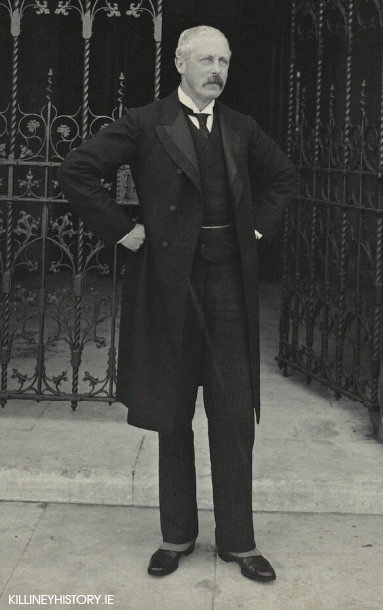
His father, Frederick, was born in Stowting, Kent, in the south east of England. He became a Land Commissioner in 1872 and in the same year he was living in Killacoona, a small village in County Fermanagh, when he married Charlotte Mary Bellingham, who came from a long established Anglo-Irish family able to trace its ancestry – at least on the Bellingham side – to the town of Castle Bellingham, in County Fermanagh, from the late 16th century. At the time of Evelyn’s birth, Charlotte’s father was a baronet and the family included barristers, magistrates, and at least one diplomat. Charlotte’s cousin was Alan Brooke who was to become Viscount Alanbrooke following his role as Chief of the Imperial General Staff in World War 2.
Frederick and Charlotte Wrench moved with their family to Killiney in about 1890 settling in at the house known as Kildimo but which they renamed Killacoona after the village where Frederick had lived at the time of his marriage. And as a side issue, when Frederick retired in about 1910, he and Charlotte moved to Hythe, not far from Stowting where Frederick had been born, where they also named their house there, Killacoona.
His early life
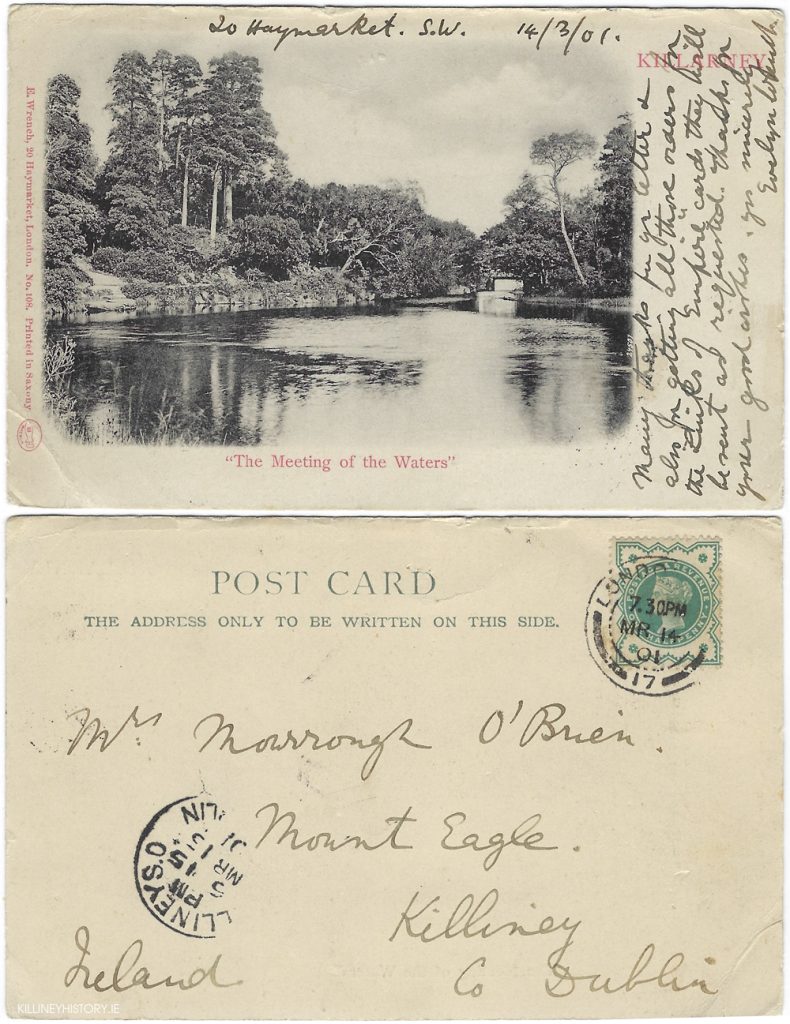
So it was, that aged about eight, Evelyn moved with his parents and siblings to Killiney. His family there included Frances Smythe, Evelyn’s aunt on his mother’s side. Born Frances Anne Jane Bellingham, she had married Richard Altamont Smythe, a JP and retired naval captain, in 1869. They lived at Abingdon (Shanganagh) with their three daughters and one son. Their second daughter, Frances, a contemporary of Evelyn’s, married Henry Eoghan O’Brien, the grandson of the 4th Earl of Inchiquin in 1905. Evelyn was on corresponding terms with Henry’s mother, Mrs Murrough O’Brien (nee Ellen Waller), Murrough being her husband’s name and a common name throughout the line of the Earls of Inchiquin. She and her husband, Murrough, lived at Mount Eagle, Killiney.
Despite being educated in the English Home Counties, Evelyn spent his holidays in Killiney. On his trips home, Evelyn made a point of visiting his various relatives – his sister Mary Porter at Lurganbrae (Shanganagh), the Smythes at Abingdon (Shanganagh), and others.
Evelyn was initially educated at Summer Fields, a private preparatory school, in Oxford. He was a middle-ranking student, but a popular one, endowed with considerable energy. On one occasion Dr Williams, the headmaster, wrote to Evelyn’s father “I’m keeping Evelyn in bed today as his temperature is a little above normal – and I am very glad that at last I have an excuse for sending him there!”.
In 1896, he left Summer Fields to be educated at Eton where he hated Latin but enjoyed arithmetic and geography. By the spring of 1899, his parents, fearing that his strength was not up to his remaining at Eton, took him away from the school. He spent four months at home in Killiney, and then during the summer and early autumn he travelled with Winifride, his sister, through Russia, the Caucasus, the Crimea and Asia Minor. He returned home still unsure what his future life would be.
Wrench Limited
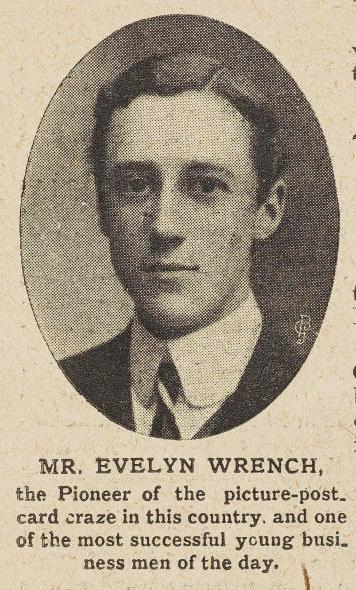
To help him decide, his father arranged for him to spend the first months of 1900 living with the aristocratic Hoelzgen family at their home in the Taunus mountains of western Germany, with the objective of learning German. There Evelyn became impressed with the growth of picture postcards, being told for instance “by the waiter at the leading inn in Weilburg” that they sold as many as 250 cards on a Sunday. After visiting several printers in Germany to get an indication of prices, by October Evelyn had determined to become a publisher of picture postcards.
He persuaded his father, by telegram, to travel from Killiney to Germany where Evelyn asked for his father’s backing for this postcard venture. Frederick duly arrived two days later. After a brief discussion, he agreed to provide the financial support and Evelyn’s postcard publishing business was born – 26 days short of his 18th birthday.
He set himself up in a two-roomed office in London’s Haymarket and by December, was selling cards printed to his specification in Germany. The company grew and less than three years after its start, Wrench Limited occupied four buildings in Arthur Street, just to the east of Oxford Circus, employed 100 people, and held stocks of 4 million cards.
Evelyn was very keen on American business methods and what he referred to as “American push”, using the phrase “American methods” in promoting his business. But he nevertheless ran a somewhat chaotic business, with endless troubles arising from misnumbering of cards which came from a dozen or more printers mainly based in Dresden and Leipzig, in Germany. Putting this chaos right cost him much time and not a little money.
Some Killiney houses mentioned in his diary and associated with his family and friends
One of his senior colleagues was James “Jimmy” Caulfeild Goff. Jimmy hailed from Kingstown (Dun Laoghaire), they mixed in the same social circle being related in a convoluted way – Evelyn’s uncle, Alan Bellingham, had a brother-in-law who was married to Jimmy Goff’s cousin. But Jimmy proved not to be adequate at his job and Evelyn suffered agonies over what to do before sacking him in 1903. Nevertheless, Jimmy went on to success including being Chairman of the food company, Crosse & Blackwell Limited, after World War 1.
Although he does not seem to have lived in Killiney, Jimmy had an uncle, John Crosbie Goff, who lived at Clonard until his death in 1904. His widow remained in the house until 1907. And in the 1870s, Thomas Goff (possibly another cousin or at least relative of Jimmy) lived at Evergreen Lodge.
By the time of his coming of age in October 1903, celebrated by a dinner at The Criterion in Piccadilly Circus, Evelyn was described as youthful looking as his years, slightly-built with dark eyes, alert with a youthful and fresh personality, and as an article in the Weekly Despatch noted he had “a delightful charm of manner”. He spent time, when he could in Killiney, even though this involved an overnight journey first by train from Euston, in London, to Holyhead and then by boat to Kingstown (Dun Laoghaire), where he was usually met by a trap that took him the last few miles to his parents’ home at Killacoona.
While in Killiney, Evelyn took time to visit local residents, who were probably family friends, including a Mr Palmer who may have lived at Eirene, and Mrs Lefroy, probably the wife of Very Revd Jeffry Lefroy, Dean of Dromore. Mrs Lefroy died at Mentone after 1907.
Wrench Series postcards of Killiney
Wrench Limited published about 18,000 cards between December 1900 and July 1904. Most were scenes in the British Isles, a handful of which were from Ireland. Four or five cards featured Killiney and it is quite likely that they were taken by Evelyn Wrench’s father, Frederick Stringer Wrench, who was a keen photographer.
A non-exhaustive list of cards also featured The Scalp, Glen of the Downs, and Poulaphuca Fall (Co. Wicklow), Sorrento Terrace and Dalkey Island, Ovoca, Arklow, Howth, Kingstown (Dun Laoghaire) and a number of scenes in Dublin, as well as scenes in Killarney, Co. Athlone and Belfast.
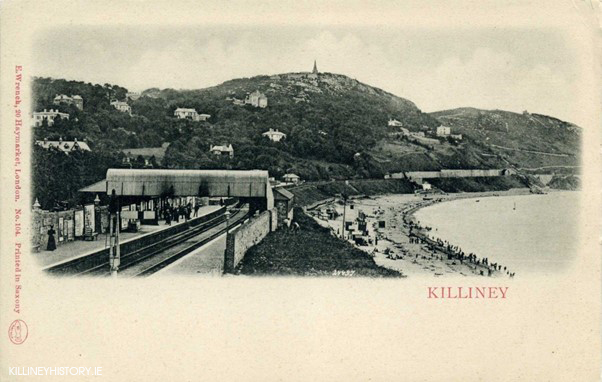
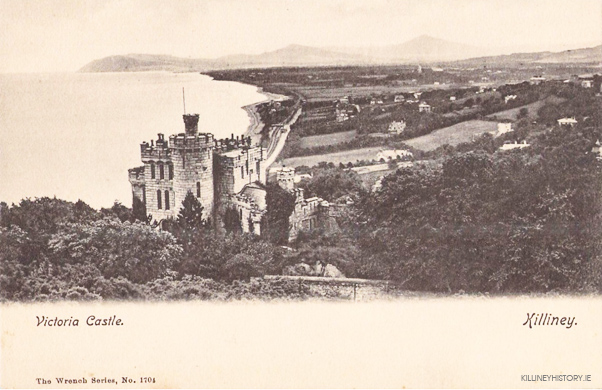
An accident
Like many young men at the time, Evelyn was given to much cycling both in London and while in Killiney. In April 1903 he wrote in his diary about a cycle ride with Charlotte, his mother, and his sister Winifride; they set off at 11.0 for Ballyphilip and although it threatened to rain, the weather stayed fine. Evelyn wrote “The ride thro’ the Glen of the Downs is certainly charming and the country was looking beautiful.” After tea they had to mend some punctures and rode to Greystones before getting home the rest of the way by train.
A couple of days later, a cycle ride had a more dramatic outcome. Evelyn, once again with Winifride and his mother, set off for Glencree. At Sandyford They “took a wrong turning up into the mountains” where they had lunch “in a peasant’s cottage”. Snow started to fall and on the way back, Evelyn’s mother lost control. Evelyn and Winifride lost sight of her until they found her at the bottom of the hill lying in the road covered in blood. Initially believing she was dead, Winifride rode off to Dundrum to get a doctor. Evelyn carried his mother her into a peasant’s cottage, where they bathed her face and washed her clothes, before Winifride arrived with Dr Cahill. Over the course of the next couple of days, it transpired that Evelyn’s mother suffered two skull fractures. She recovered but continued to suffer the effects for months, and possibly years, afterwards.
In October 1903, Evelyn cycled once again to Ballyphilip, this time with a couple of friends. On the way back his bicycle “broke down” in Kilcool and so Evelyn borrowed one from the police to continue his journey home via Bray.
Postcard business success – and failure

Wrench Limited was probably the third largest picture postcard publishing postcard business in the country, in 1903; it was definitely the largest “pure play” postcard publisher although other models existed. For example, Raphael Tuck & Sons, and Valentine’s of Dundee, published postcards but were also publishers of greeting cards.
This success was helped by Evelyn’s connections with influential people both through his father, and through his connection with his Etonian contemporaries. One of the former was Lord Esher who as, Minister of Works, was able to secure the postcard “franchise” for Wrench Limited at The Tower of London, Windsor Castle, Hampton Court and other popular leisure destinations. Other members of Evelyn’s circle included Philip Agnew, owner of Punch, who supplied some of the magazine’s cartoons that Evelyn published as a series of postcards.
But Evelyn’s success came at financial cost – basically it was unprofitable and consequently cash was an ongoing problem. At the same time, the market was changing with the growth of coloured cards which were more expensive to print than the black and white cards that were the mainstay of Evelyn’s business. After receiving additional funds on several occasions from his parents, especially his mother, by the autumn of 1903 they became unable (or unwilling) to support Evelyn’s venture any more.
So, at this time, one of his directors, Hugh Spottiswoode, introduced Evelyn to Alfred and Harold Harmsworth, owners of The Amalgamated Press, the very successful newspaper and magazine publishing company. They agreed to back Evelyn to the tune of £7,000 (perhaps €750,000 in today’s money), but the losses continued and after a few months, they too were no longer willing to support the business, putting it into liquidation in the summer of 1904 by when it had published a total of about 18,000 different cards and reprints.
Although the business was resurrected six months later, Evelyn was no longer involved. Instead he started working for the Amalgamated Press in various managerial and editorial roles in connection with the Daily Mail, the Weekly Dispatch, and in other roles. In 1910, with the help of Alfred Harmsworth he launched what would eventually become the Royal Over-Seas League.
Later life
Evelyn left in the Amalgamated Press in 1912 and during World War 1, he joined the Royal Flying Corps, ultimately being given control of the British Empire section at the Ministry of Information. During the war, too Evelyn unsuccessfully attempted to found an Irish Unity League, to promote the idea of a united Ireland within the British empire. He had more success in creating the English-Speaking Union to promote friendship between the British Empire and the United States,
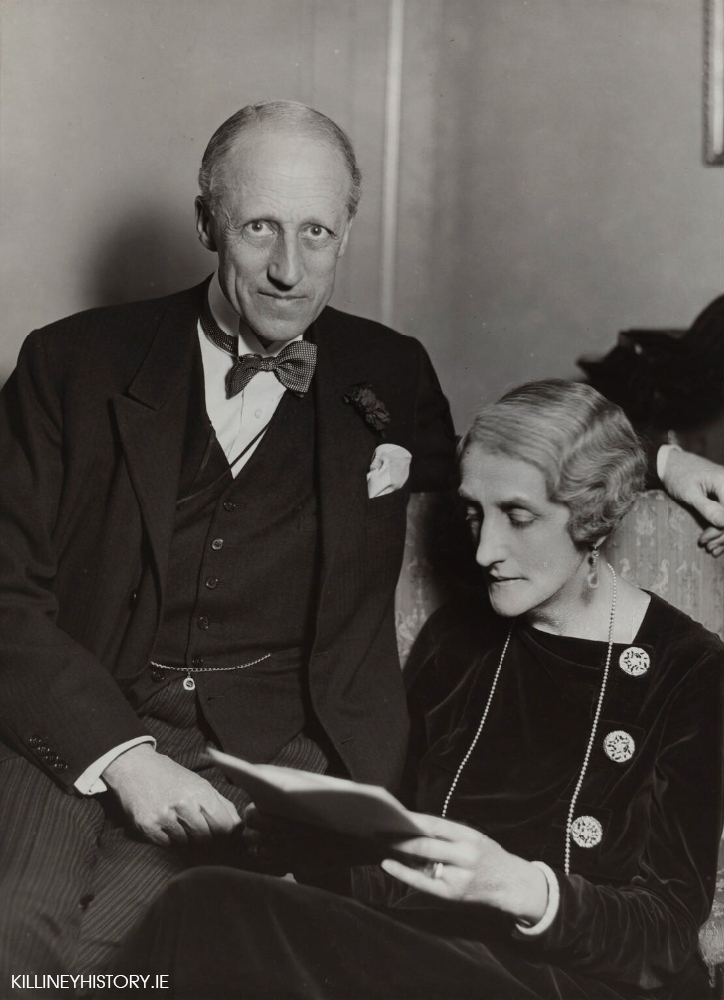
In 1922, Evelyn started writing for The Spectator whose board he subsequently joined and, buying a controlling interest in the magazine in 1925, he was editor until 1932, being knighted that year. In addition to his roles at The Spectator, Evelyn spent the period between the two world wars devoting much effort to the Royal Over-Seas League and the English-Speaking Union.
He married Hylda Des Vouex in 1937 – she was Evelyn’s cousin and the widow of Sir Frederick Des Voeux. After being stranded in India during World War 2, they retired to Marlow, just to the west of London, where Evelyn wrote several biographies. He died in 1966 having been predeceased by Hylda in 1955. They are buried side by side at the edge of the Thames in the churchyard of All Saints Church, Marlow.
Evelyn Wrench was an energetic and likeable person, who having spent his formative years in Killiney, did a little bit to change the world, probably for the better.
Appendix – Some sources
“Uphill – The First Stage of a Strenuous Life”. Sir Evelyn Wrench. Nicholson and Watson, London. 1934
“Struggle 1914-1920”. Sir Evelyn Wrench. Nicholson and Watson, London. 1935
“Wrench, Sir (John) Evelyn Leslie”. Oxford Dictionary of National Biography. 2004 and 2009
Evelyn Wrench diaries for 1900, 1903 and 1905 – British Library
“Milestones” – Volume 1 of Evelyn Wrench’s scrapbooks – British Library